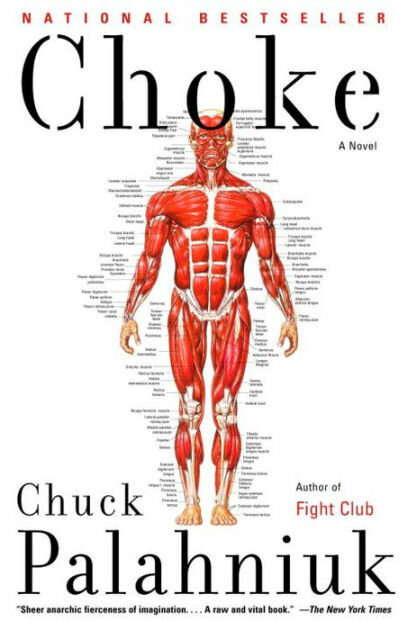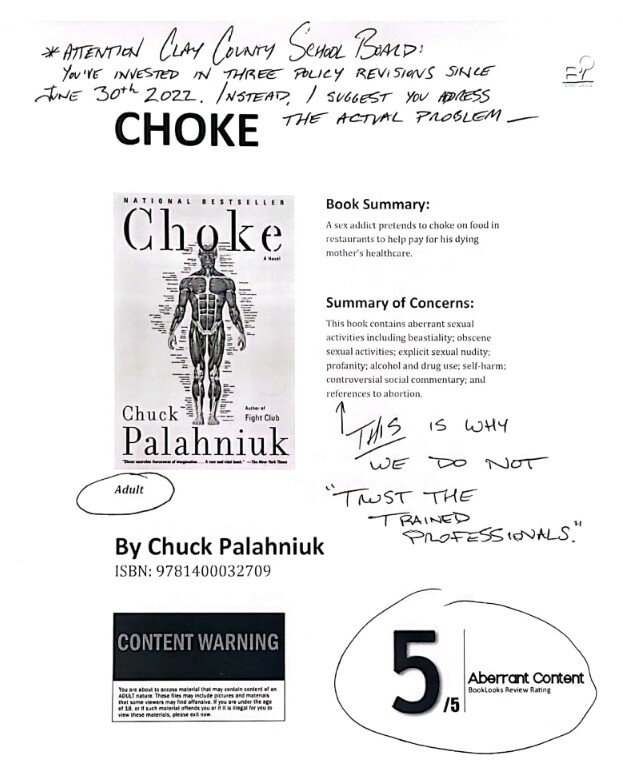Bruce Friedman's Book Club: 'Choke' by Chuck Palahniuk
“Choke” is an erotic black comedy by Chuck Palahniuk, and the penultimate installment in the Bruce Friedman’s Book Club series.
See also: “Heroine” by Mindy McGinnis
See also: “At the End of Everything” by Marieke Nijkamp
See also: “Imaginary Friend” by Stephen Chbosky
Bruce Friedman said that out of all his challenges there isn’t necessarily a “worst book,” but this novel was “one of the very worst.” Just glancing at his challenge form from his database, you can see why he would think so.
It's a clear win from his corner.
The narrative follows Victor Mancini, his sexual compulsion and his compulsive lying. The conflict stems from the antihero protagonist’s inability to take accountability and complete the fourth step in his sex addict anonymous program, which involves writing a complete and relentless story of his addiction. Partly because he doesn’t want to stop, partly because doing so requires his past trauma to be unearthed.
Ironically, the novel itself is his fourth step. It’s written in a stream of conscious narrative, chronicling and satirizing the protagonist’s sexual escapades. Indeed, it would be naive to say “Choke” is not pornographic and wrong to say that this book does not violate FS 847.
With that said, the book was an unforgettable read, with Palahniuk doubling down on many of themes presented in his previous classic, “Fight Club.”
Even with such graphic content, the prose is admittedly artful and witty. The author uses vulgar scenarios to illustrate ironies in recreational sex and health care. While decisively not recommendable to minors, the novel is filled with obscene and outlandish ironies to convey its surprisingly profound message.
My favorite was the novel’s exploration of the literary trope, the “Christ-like figure.” In a twisted, delusional and definitely depraved comparison, the protagonist is presented as the second coming of Christ.
The protagonist assumes the sins of others in his mother’s nursing home, and by “choking” in restaurants he offers up his body for the “salvation” of others. The novel attempts to put a fundamental Christian tenet to the test – Christ is in everyone, even in the most sinful self-indulgent.
Mostly.
Because while all people have the capacity to emulate Christ, the novel differentiates that with the delusion of replacing Him. Instead of curing his mother like he hoped, the protagonist ends up inadvertently killing her. She chokes to death on spoon-fed pudding.
“Choke” is complicated in moments, vapid in others and vulgar all throughout as the narrative attempts to humanize the sinful. There is a layer of genius underneath the shock humor and grimacing descriptions of sexual content. This book is not for everyone, not even for those who may be fans of “Fight Club.”
Despite even in what could be considered the “dirtiest” book to ever wind up in a Clay County District School library, there is still a take-home message. Similar to “Diary of an Oxygen Thief” by Anonymous, the antihero still pertains redeemable qualities underneath a shell of self-depravity and nihilism.
“Choke” was understandably removed because sex is such an integral component to the story. “Imaginary Friend” was removed likely because of a singular sexual scene. Not moved to a “parental advisory” or “mature section.” Removed.
Would you put “Choke” and “Imaginary Friend” in the same wheelhouse?
How about the Bible, which is listed at an "adult interest level" and also contains sexual content, violence and references to bestiality? Should we submit a challenge to the Bible next?
No, we shouldn't. It would be pedantic to dimmish the entirety of the word of God to certain verses and references.
There’s a difference between “sex” and “pornography.” With every book, context matters and so does media literacy. The value of the any book should be evaluated as it's "taken as a whole." It would be intentionally reductive to do otherwise.
This is why "Choke" should go and "Imaginary Friend" should stay, although its problematic passage should be acknowledged.
In the same way one page containing sexual content does not make a book “porn,” one book that has been removed for “porn” does not make an entire library “porn.”
I will make the argument that the 284 titles removed (and 58 additional titles that have been deselected/removed) from a collection of over 20,000 does not make the entirety of CCDS libraries porn either. Although, Friedman says it does.
“The truth is out – the libraries are still filled with porn,” Friedman said during the school board meeting on March 7.
School Board Member Michele Hanson appeared to agree.
“We have a citizen who has been reading books and doing challenges – hundreds and hundreds and hundreds of challenges – and 32 of them were pulled from the shelf last week. So, are we to say that we should not tell parents that we had 32 books, obscene, pornographic books, pulled last week? But it’s OK for your kids to go in there? It doesn’t make sense to me,” Hanson said.
One of those books was “Imaginary Friend."
“We don’t have clean libraries,” Hanson said.
I disagree with this sentiment. Partly because we’re talking about 1% of a book constituting 1% of books in the collection of CCDS libraries. Partly because Friedman himself admits that many challenges were made based on principle and not because they had merit.
“The books that have been pulled are porn. The fact that I have also challenged things that are not porn – I had my reasons – a lot of times that’s what it took to get the dialog to this level,” Friedman said during the school board meeting.
In total, Friedman has single-handedly submitted over 600 book challenges and over 400 appeals. It’s honestly remarkable civic engagement.
However, an acknowledgment must be made that some in his towering stack of challenges may admittedly be frivolous. But, based on the doctrine to “err on the side of caution,” it would not be unreasonable to believe some of the less convincing challenges gained traction.
Which inflated the numbers of books removed. Which leads to an incorrect extrapolation that the entire CCDS library is pornographic.
The law states it is within Friedman's or any parent's right to challenge a book, even for personal reasons. Casting such a wide net though may reel in some mistakes.
There have been 90 recent book challenges that have been removed and then put back, including “Sulwe” by Lupita Nyong'o.
It is disingenuous to insinuate that the entire library system of Clay County is “dirty” when it may be the most rigorously thorough public school library system in the nation. I don’t have any data to back that up, but it certainly feels like it.
Considering that Escambia County’s decision in the face of enormous book challenges was allegedly to pull everything, I do commend Clay County for attempting the best they could to maintain a holistic approach. I still hold the belief that books should be read and then judged holistically.
I like the direction the school board’s policy proposal is taking. I like the hybrid opt-in/opt-out model. It strikes a compromise that empowers a wide range of parental decisions without suffocating media specialists.
During the workshop on Feb. 27, I shared School Board Member Mary Bolla’s skepticism regarding the rubric guidelines and how they may be enforced, but I have since warmed up to the idea. I think having guidelines to flag something as parental advisory is fine, as long as the books that are flagged are still accessible by parents who have opted in.
See also: "Imaginary Friend"
I will publicly support the school board’s policy if that condition is met.
For the finale of Bruce Friedman’s Book Club, I wanted to come full circle. I wanted to end the series with the book that started it all – “All Boys Aren’t Blue” by George Johnson. This last entry will come out a week before the school board meeting on May 2, the final hearing and decision for the new policy.











